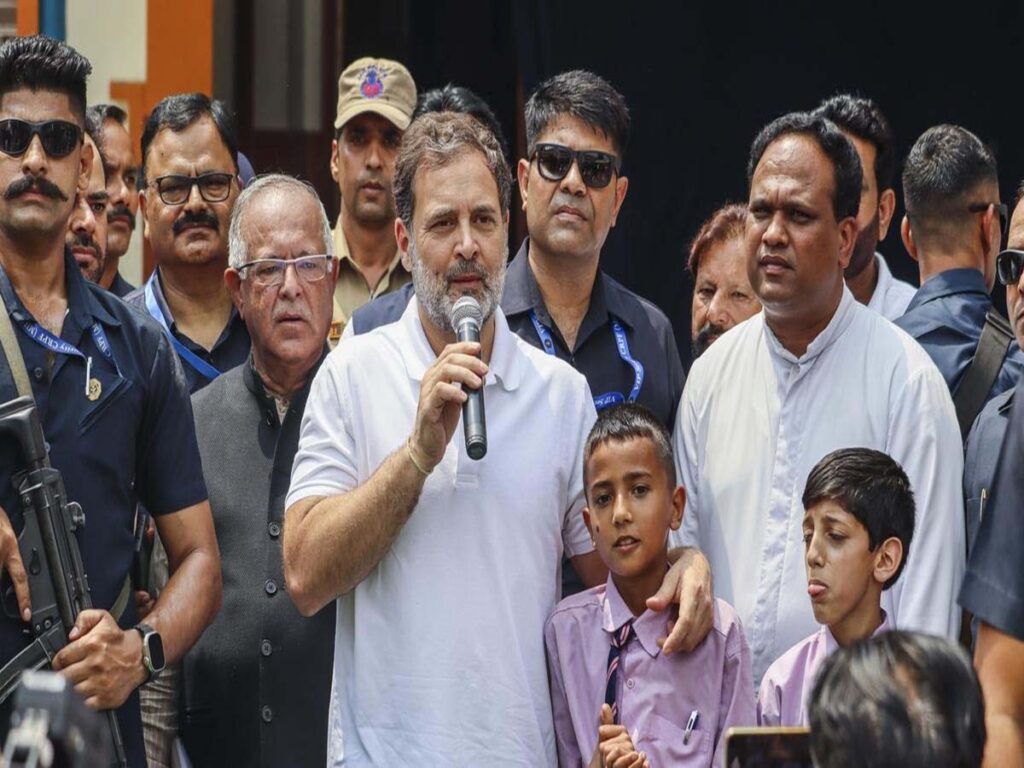New Delhi: On May 24, 2025, Congress MP and Leader of the Opposition in the Lok Sabha, Rahul Gandhi, visited Jammu and Kashmir’s Poonch district to meet families affected by recent cross-border shelling by Pakistani troops, marking his second visit to the Union Territory since the April 22 Pahalgam terror attack that killed 26 people. Gandhi expressed solidarity with the victims, promising to address their concerns at the national level.
Solidarity with Affected Families
Gandhi met with families who suffered losses during the shelling, describing the scenes he witnessed: “Broken houses, scattered belongings, moist eyes, and painful stories of losing loved ones in every corner—these patriotic families bear the biggest burden of war with courage and dignity every time.” He saluted their resilience and committed to advocating for them, stating, “I stand strongly with the victim families—I will definitely raise their demands and issues at the national level.” Reports indicate that the shelling between May 8 and 10 killed 27 people and injured over 70 in the Jammu region, particularly Poonch, displacing thousands to relief camps.
Reassuring the Next Generation
During his visit, Gandhi interacted with school students in Poonch, offering words of encouragement amid the tense situation. “Now, you have seen danger and a little bit of a frightening situation, but don’t worry, everything will come back to normal. Your way of responding to this problem should be that you study and play really hard and make a lot of friends in school,” he told them, aiming to instill hope and resilience in the younger generation affected by the conflict.
Assessing the Damage and Amplifying Voices
Speaking to reporters, Gandhi highlighted the extent of the destruction, noting, “There has been huge damage.” He added, “I spoke with the people and tried to understand their problems. They have requested me to raise this issue on the national level, and I will do that.” His visit included stops at shell-hit structures, such as a gurdwara, a temple, a madrassa, and a Christian missionary school, where he also met with bereaved families and civil society members, as reported by the Jammu and Kashmir unit of the Congress.
Context of India-Pakistan Tensions
The Poonch shelling followed heightened tensions after the Pahalgam terror attack on April 22, which claimed 26 lives, mostly tourists. India launched Operation Sindoor on May 7, targeting nine terror camps in Pakistan and Pakistan-occupied Kashmir, including the headquarters of banned outfits Jaish-e-Mohammed in Bahawalpur and Lashkar-e-Taiba in Muridke. Pakistan retaliated with missile and drone attacks, which were thwarted by Indian defenses, leading to Indian strikes on Pakistani airfields. A ceasefire was agreed upon on May 10, halting the four-day conflict. The violence has caused significant civilian tolls, with 12 civilians and one soldier killed in Poonch alone during the shelling, alongside widespread infrastructural damage.
Broader Implications and Support
Gandhi’s visit underscores the human cost of the conflict, with over 20,000 Indians killed in terrorist attacks linked to Pakistan over decades, as stated by India’s UN representative on May 23, 2025. The Congress leader’s actions reflect a call for unity, echoing his earlier statements after the Pahalgam attack that such incidents aim to divide society, and India must stand united to defeat terrorism. His commitment to raising these issues nationally aligns with the opposition’s support for the government’s anti-terrorism measures, though some voices, like Congress MP Shashi Tharoor, have criticized Pakistan’s ceasefire violations as habitual.


